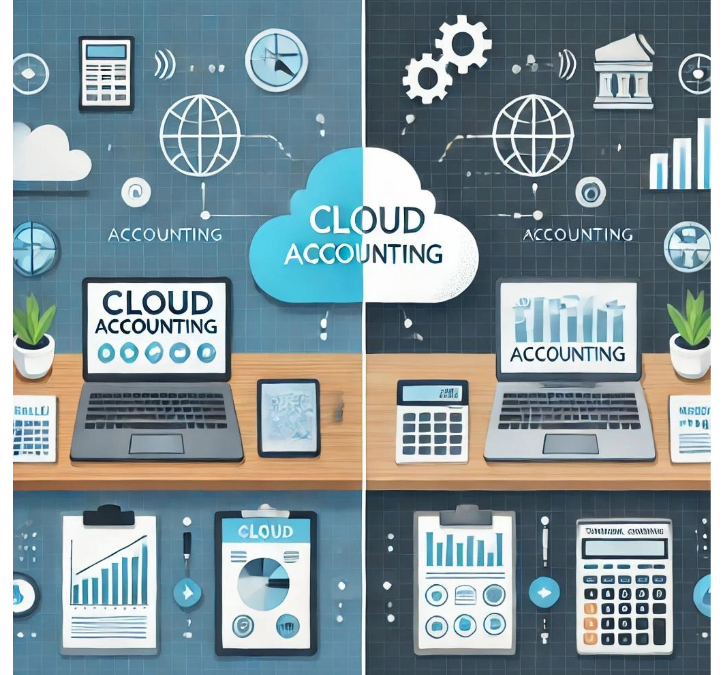In today’s digital age, businesses of all sizes are faced with the decision of whether to adopt cloud-based accounting software or stick with traditional accounting methods. Both approaches have their pros and cons, and choosing the right one depends on the needs, preferences, and resources of your business. In this blog, we’ll explore the key differences between cloud accounting and traditional accounting, helping you make an informed decision for your business.
What Is Cloud Accounting?
Cloud accounting refers to using accounting software that is hosted on remote servers. Rather than installing software on a local computer, you access it over the internet. Well-known platforms such as Xero, QuickBooks Online, and MYOB Essentials allow users to manage their accounts anytime and anywhere, provided they have an internet connection.
What Is Traditional Accounting?
Traditional accounting involves desktop-based software or even manual accounting processes like spreadsheets and paper records. Programs like QuickBooks Desktop and MYOB AccountRight fall into this category. While they don’t require an internet connection to operate, they do require physical installation on a device.
Pros of Cloud Accounting
- Accessibility
Cloud accounting platforms are accessible from anywhere, at any time. Whether you’re at the office, home, or traveling, you can log in to your account and manage your finances. This flexibility is especially useful for business owners who travel frequently or have remote teams. - Real-Time Data
With cloud accounting, financial data is updated in real-time. This means you can view up-to-date financial information and make informed business decisions quickly. Traditional methods often involve manual updates, which can lead to delays in reporting. - Collaboration Made Easy
Since cloud accounting allows multiple users to access the same system, collaboration with your accountant, bookkeeper, or other team members is seamless. You don’t need to email files back and forth or worry about version control, as everyone is working on the same data. - Automatic Backups & Updates
Cloud-based accounting systems are regularly backed up, so you don’t have to worry about data loss due to a hardware failure. Plus, software updates happen automatically, ensuring that you’re always working with the latest version without the need for manual installation. - Cost-Effective
Cloud accounting services usually operate on a subscription model, making them more affordable in the short term as you don’t need to invest in expensive software licenses. Furthermore, the scalability of these services means you can easily upgrade your plan as your business grows.
Cons of Cloud Accounting
- Dependent on Internet Connection
Cloud accounting requires a stable internet connection. If you operate in areas with limited or unreliable internet access, this could be a significant drawback. - Security Concerns
While reputable cloud accounting platforms implement robust security measures, some businesses may still have concerns about storing sensitive financial data online. However, many platforms provide encryption and security measures that are often stronger than on-premises solutions. - Subscription Costs Over Time
Although cloud accounting has lower upfront costs, the ongoing subscription fees can add up, especially for businesses that remain small and might not need all the features available.
Pros of Traditional Accounting
- No Internet Required
Traditional accounting systems operate offline, so there’s no need to rely on an internet connection. This can be especially advantageous for businesses in areas with poor connectivity. - Greater Control Over Data
Since the software is hosted locally, you maintain complete control over your data, which may offer peace of mind to business owners who are concerned about security in the cloud. - One-Time Purchase
Traditional accounting software typically involves a one-time purchase, which might be more cost-effective for businesses that don’t want to commit to ongoing subscription fees.
Cons of Traditional Accounting
- Limited Accessibility
Since the software is installed on a local computer, you can only access your financial data from that specific device, limiting flexibility. Remote work or collaboration with accountants becomes more challenging without physical file transfers or VPN setups. - Manual Updates & Backups
Traditional accounting systems often require manual software updates and data backups, which can be time-consuming and prone to error. There’s also a risk of data loss if you forget to back up regularly. - Higher Upfront Costs
While there are no recurring fees, the upfront costs for traditional accounting software can be significantly higher. Businesses will also need to pay for upgrades if they want to access new features or improvements. - Limited Integration
Many traditional accounting systems offer fewer integration options with other business apps compared to their cloud counterparts, making it harder to streamline operations.
Which Is Better for Your Business?
The decision between cloud accounting and traditional accounting largely depends on the size, nature, and needs of your business.
- Cloud accounting is ideal for businesses that value flexibility, need real-time collaboration, and prefer a subscription-based model with lower upfront costs. It’s particularly well-suited for small and medium-sized businesses that want to scale without worrying about software installation or maintenance.
- Traditional accounting might be better suited for businesses with limited internet access, those who prefer a one-time software investment, or those with strict data control needs. However, these businesses may sacrifice convenience, flexibility, and real-time data access in the process.
Conclusion
There’s no one-size-fits-all answer to whether cloud or traditional accounting is better. It comes down to your business’s specific needs, budget, and how you operate. Cloud accounting offers flexibility, scalability, and automation, while traditional accounting offers greater control and might be more comfortable for businesses that don’t need constant updates. Evaluate the pros and cons carefully and choose the system that will best support your business’s growth and financial management.
